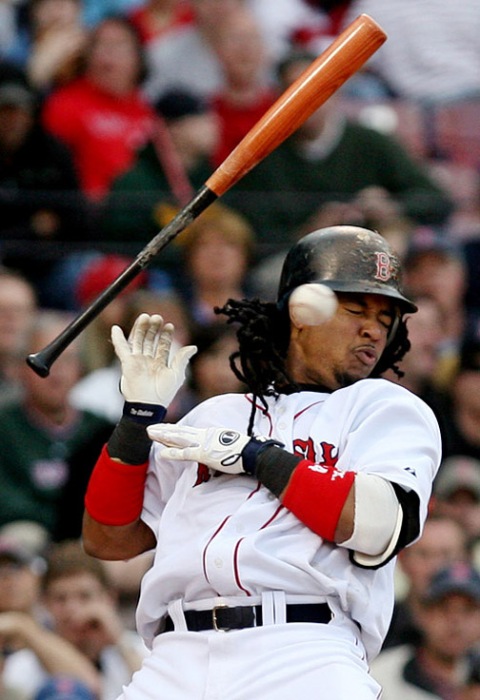For those of you who haven't heard, it appears that the New Orleans Saints defense offered its players cash rewards for injuring opposing players. $1,000 for taking a guy out of the game, another $1,000 if they were carted off on a stretcher. Players like, say, Brett Favre.

So far, it seems almost all of the conversation can be summed up as either "this is utterly despicable" or "this happens on almost every team in the league." Let's brush past the fact that it's almost certainly both. I'm not interested in discussing whether this is okay or whether it's widespread; I don't want to pass judgment on the practice or determine how pervasive it is. I'm over it, and other people have done it better than I have anyway.
But there is another facet I haven't seen discussed that I'd like to take a look at. We have lots ways to resolve our disputes, ranging from rigid and institutionalized to loose and informal. We use one set of practices when we have a disagreement with a friend, and entirely another when we discover our employee has been embezzling money from our corporation. But the boundaries between these systems aren't always clear; in fact they're
rarely clear. In, for example, a sexual harassment case, there might be legitimate claims to informally discuss the matter, to engage a corporate or university policy,
and to invoke the official laws of the land. We have to navigate and negotiate the boundaries between these varied mechanisms.
The Saints bounty scandal sits in a space overlapped by three different frameworks of dispute resolution. Though it won't be invoked here, black-letter law is lurking in the shadows behind. There is, of course, the NFL's semi-formal institution and disciplinary body - which will have something to say about the scandal, and soon. And finally - but maybe most interestingly - players will impose their own brand of justice and dispute resolution on the field when the league resumes play in the fall.
The Not-Quite-That-Long Arms of the Law
Chris Kluwe (@ChrisWarcraft), Vikings punter: "You're talking about paying someone to INTENTIONALLY injure someone else. They put people in JAIL for that."
Generally, you can't sue someone when you get hurt playing football. In legalese, you "assume the risk" of the possibility of injuries inherent in the game.

A hard tackle, a wrenched ankle, broken wrist, torn ACL, concussion: these are things that happen to football players in the course of playing the sport, and there's no legal remedy against the person who hurts you.
But this is only true when what happens is within the bounds of the game. A broken nose from an in-game collision in touch football is one thing, but it's quite another if it's in a fight that breaks out in the middle of the game. That's not "part of the game" and might lend itself to legal remedies. This raises tough questions about actions at the boundary. How long after the whistle would a tackle have to be for us to think that it might be outside the boundaries of the game? In hockey, fights
are a part of the game. Oddly enough, the fact that there are penalties and rules that address its illegality is evidence for the fact that it's contemplated by the game. A few years back, when Todd Bertuzzi punched Steve Moore in the back of the head in an NHL game

one question in the resulting tort litigation wasn't "is fighting part of hockey?" It was assumed that it was (can you imagine a suit for battery after a hockey fight?); the question was whether this
kind of fighting is part of hockey, and thus immune from suits. (The suit was dismissed as a matter for Canadian courts; it's still pending in Ontario).
The courts won't get involved in the Saints fiasco, but we wouldn't have to change to many things for that to be a possibility. As far as I can tell, the Saints were trying to injure people within the confines established by the rules of the game; what if they weren't? What if there were hits either egregiously late or well out of bounds? And, regardless of legal doctrine, you had better believe that if someone had been seriously injured (like, "career ending injured") or possibly even killed (perish the thought), that lawsuits would ensue. There would be suits against individual players, against coaches, against teams, and against the league. The dispute would spill over into our official legal system. This is something the NFL
obviously doesn't want to happen. Which brings us to...
The Shield. No, not the TV Show; the OTHER Shield
This one:

The National Football League, as a private organization, is ceded deference by courts to run its
own authoritative disputing process. Which is to say that when a team does something against the rules - as the Saints have done here - the NFL gets to punish them and the Saints don't get to do anything about it. This is
not the law of the land (the NFL can't tell
you what to do except when you use their product in some way), but it exists in part because the law of the land
allows it to exist. It wouldn't be much of a disciplinary system if a team like the Saints could run to the courts every time the NFL did something it didn't like. But they can't. The courts will say "no, turn around; you've agreed that Roger Goddell has authority here, and you have to live with it."
So, what will Roger do here, with his
quasi-legal executive authority?

He's going to bring the hammer down, and he's going to do it soon, I would bet. He's made such an issue of player safety (whether or not it's just a pose is a different conversation), that he can't let this go. The New Orleans Saints are going to be fined, maybe seven figures. Saints coach Sean Payton may be fined, may be suspended, ex-defensive coordinator Gregg Williams is
going to be fined and suspended. Defensive captain Jonathan Vilma is going to be fined and suspended, maybe other players too.
It's not the law, but it's law-
like. It has a legalistic process, and it has real consequences. As a dispute resolution mechanism it's not that different than police and courts, and it owes some measure of its authority to the fact that the courts have its back. But importantly, choosing between the "official" disputing institution and the NFL isn't an either or proposition. Not only does one prop up the other, but you can use both at the same time. They're overlapping legal systems (so long as we use the term broadly).
It Makes Sense that there are Teams Called the Vikings and the Cowboys
Why? Because this has all the elements of a brewing feud, of frontier justice in the making. The NFL at least has the trappings of a formal institution: a process, and executive authority, etc. When people take things into their own hands, it's not necessarily anarchy; sometimes it's just an informal institution. This happens in sports all the time. Anyone who's a baseball fan knows that if your team's star player show's up a pitcher after hitting a home run

he's probably going to get a baseball thrown at him the next time he's at the plate.

Sometimes that's the end of it, sometimes the opposing pitcher throws at the
other team's star player. Usually it ends with the "official" justice system - the umpire - getting involved and warning both teams to cut it out. In hockey, fights are part of the culture, and there's absolutely a set of rules that govern who you fight and when you do it. Someone blind sides your star, you go after their star, you settle it with a fight, and much of the time that's it. Penalties are issued and they call it even. But sometimes bad blood persists and a
longterm feud erupts.
Happens in football too. Here's what former NFL safety Nick Ferguson said in the wake of the Saints scandal:
"[Pittsburgh Steelers WR] Hines Ward was going out, taking out unsuspecting defensive players, and I didn't need anyone to tell me... I knew that the next time I played the Pittsburgh Steelers, I owed Hines Ward."
The language here is really interesting, because it has
all the hallmarks of a feud. For one, the formal institution is insufficient. What someone like Hines Ward does is not illegal - he's not going to get fined or suspended - but it's against a "code" and he needs to pay for it, it's "owed."

There's one more thing. In a feud, whether it's in baseball or the Hatfields and McCoys, you don't have to hit the guy who hit your teammate. You just have to hit one of
his teammates. Again, in baseball, if your guy get's thrown at, you don't throw at their pitcher, you throw at someone else on their team that's the rough equivalent. It's about balance. The point is that these feuds have their own rules and practices. They are
also a form of dispute resolution, one that exists alongside the more formal ones outlined above. The Saints scandal exists in a space where all three "legal" systems govern some part of it or another. The "real" legal system tells us what kind of behavior is within the NFL's purview and what's not, and gives heft to the NFL's reaction. The NFL is going to impose sanctions to try make sure this doesn't happen again, and impose suspensions and fines on the wrongdoers. But that won't satisfy players. They know their guys were targeted, and probably don't think that justice has been quite fully done.
Which means this: next year, the Saints are going to get paid back on the field, and it won't just be the defense. Right or not, the Saints offense is going to get hit for this. And if I were this guy

I would be nervous.


























